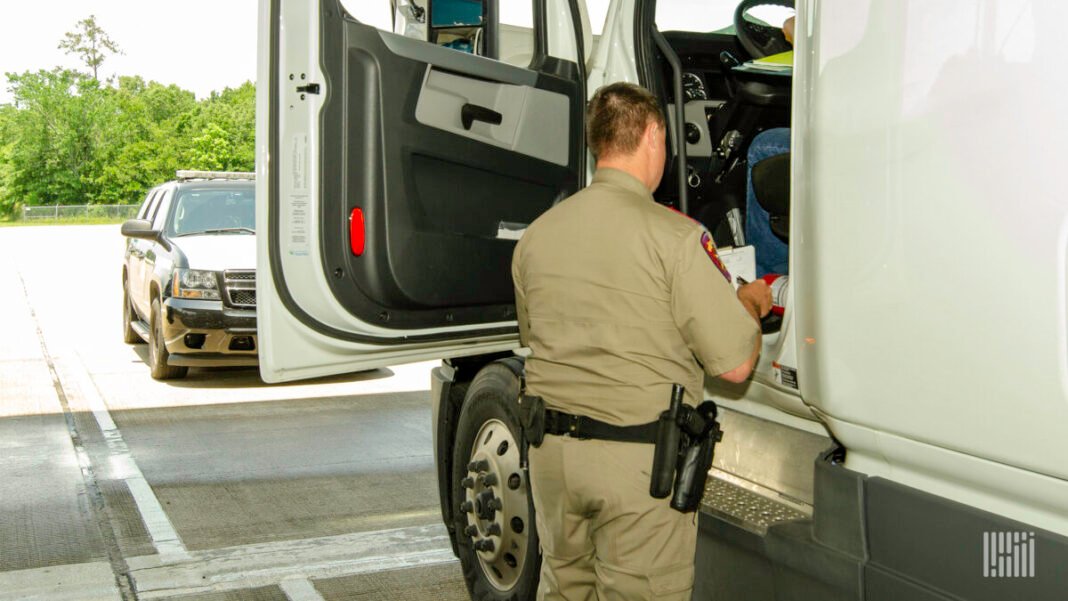WASHINGTON — The Trump administration is launching a nationwide audit of non-domiciled CDL holders in an effort to crack down on unqualified drivers who pose a potential safety hazard to the nation’s roads.
Transportation Secretary Sean Duffy made the announcement with Tim Dooner on Friday on FreightWaves WHAT THE TRUCK?!? show.
“If you listen to President Trump, it’s America first,” Duffy told Dooner. “I want to put our American truck drivers first, and that means we look at what’s happening with the non-domiciled CDLs.”
The effort is part of a sweeping package of new pro-trucker initiatives and regulatory rollbacks that includes a $275 million grant for truck parking and the cancelation of a rulemaking that would have limited top speeds for heavy-duty trucks.
“While the country sleeps, truckers grind through the night to help keep shelves stocked, families fed, and businesses humming,” Duffy said in a followup statement issued by DOT. “It’s a job that requires grit and dedication. But for too long Washington, DC has made work harder for truckers. That ends today. Thanks to President Trump, we’re getting Washington out of your trucks and your business.”
Stopping non-domiciled CDL abuse
Non-domiciled CDLs are those issued by a state to a person who is not a resident of that state and typically applies to individuals from foreign countries – excluding Mexico and Canada – or to those whose state of domicile is prohibited from issuing a CDL (FreightWaves broke down the issue of these types of CDLs in a multi-part series here).
DOT’s audit, to be conducted through the U.S. Department of Transportation’s Federal Motor Carrier Safety Administration, responds to a directive issued by President Trump in April.
The nationwide compliance review by FMCSA of states issuing non-domiciled CDLs “will examine state procedures for issuing non-domiciled CDLs to identify and stop any patterns of abuse and ensure federal standards are being met across the country,” according to DOT.
Millions for truck parking
DOT’s grant aimed at alleviating a long-standing shortage of truck parking includes $180 million to add 917 new truck parking spaces in Florida along the I-4 corridor in Volusia, Seminole, and Osceola Counties.
“Florida is one of the first states to create a robust pipeline of truck parking projects to address both immediate and future needs, and this grant … will help deliver nearly 1,000 additional truck parking spaces to serve Central Florida communities,” said Florida Department of Transportation Secretary Jared Perdue in a press release.
Speed limiter rule withdrawn
Under the Biden administration, FMCSA and the National Highway Traffic Safety Administration announced plans to resurrect a speed limiter rulemaking issued in 2016 during the Obama administration through an updated supplemental Notice of Proposed Rulemaking (NPRM).
But FMCSA’s notice in April 2022 merely announcing its intention to issue the supplemental NPRM generated over 16,000 comments – mostly negative and mostly from owner operators.
The schedule for publishing the NPRM was delayed several times, with May 2025 the most recent date listed on the U.S. Department of Transportation’s regulatory agenda.
With Friday’s announcement, that rulemaking is now off the table.
“FMCSA and [NHTSA] are withdrawing a joint rulemaking that proposed to require speed-limiting devices on heavy vehicles,” DOT stated. “This decision respects the professionalism of drivers and acknowledges the proposed rulemaking lacked a sufficiently clear and compelling safety justification.”
DOT’s package of initiatives affecting the trucking industry also includes the following:
Regulatory Relief and Flexibility
- Electronic Logging Device (ELD) Exemption Maintained: DOT is committed to not extending the Electronic Logging Device (ELD) mandate to pre-2000 model year trucks.
- Commitment to address unlawful brokering: FMCSA is renewing its focus on combating unlawful double brokering.
Hours of Service
FMCSA is launching two new pilot programs to study increased flexibility in hours-of-service regulations, with the goal of gathering data on whether giving drivers more control over their schedules can improve rest and enhance safety.
- Flexible sleeper berth: This pilot will allow participating drivers to split their 10-hour off-duty period into more flexible combinations, including 6/4 and 5/5 splits.
- Split-duty periods: This pilot will allow participating drivers to pause their 14-hour on-duty period for a period of no less than 30 minutes and no more than 3 hours.
Digital upgrades
- Refreshed driver resources webpage: FMCSA’s website now features a more user-friendly and mobile-friendly driver resources page. The page has clear sections for truck and bus drivers to quickly find relevant information.
- DataQs system update: The agency is proposing revisions to the DataQs requirements for Motor Carrier Safety Assistance Program grant funding to ensure proper due process for drivers. The goal is to improve the impartiality, timeliness, and fairness of the data review process.
- National Consumer Complaint Database (NCCDB) update: The NCCDB, which receives 25,000-30,000 complaints annually, is being migrated to a modern customer service platform to be more user- and mobile-friendly. The first release is scheduled before September 30th, and the update will streamline the response process, improve response timeliness, and expand complaint categories to include property brokers.
Representatives of both owner-operators and major trucking firms praised DOT for the changes.
“For years, truckers have urged Washington to address the severe shortage of truck parking, eliminate the dangers posed by a national speed limiter mandate, and give drivers greater control over their hours-of-service,” said Owner-Operator Independent Drivers Association President Todd Spencer in a press release.
“These steps not only improve the daily lives of truckers across America, but also enhance safety for everyone on the road.”
American Trucking Associations President Chris Spear commented in a press release that trucking is critical to America’s economic growth and security, “and data-driven measures like these that reduce regulatory burdens are important steps toward that end,” Spear said.
“We look forward to continued partnership with the administration to advance policies that strengthen America’s supply chain and bolster our essential workforce.”
Related articles:
Click for more FreightWaves articles by John Gallagher.


